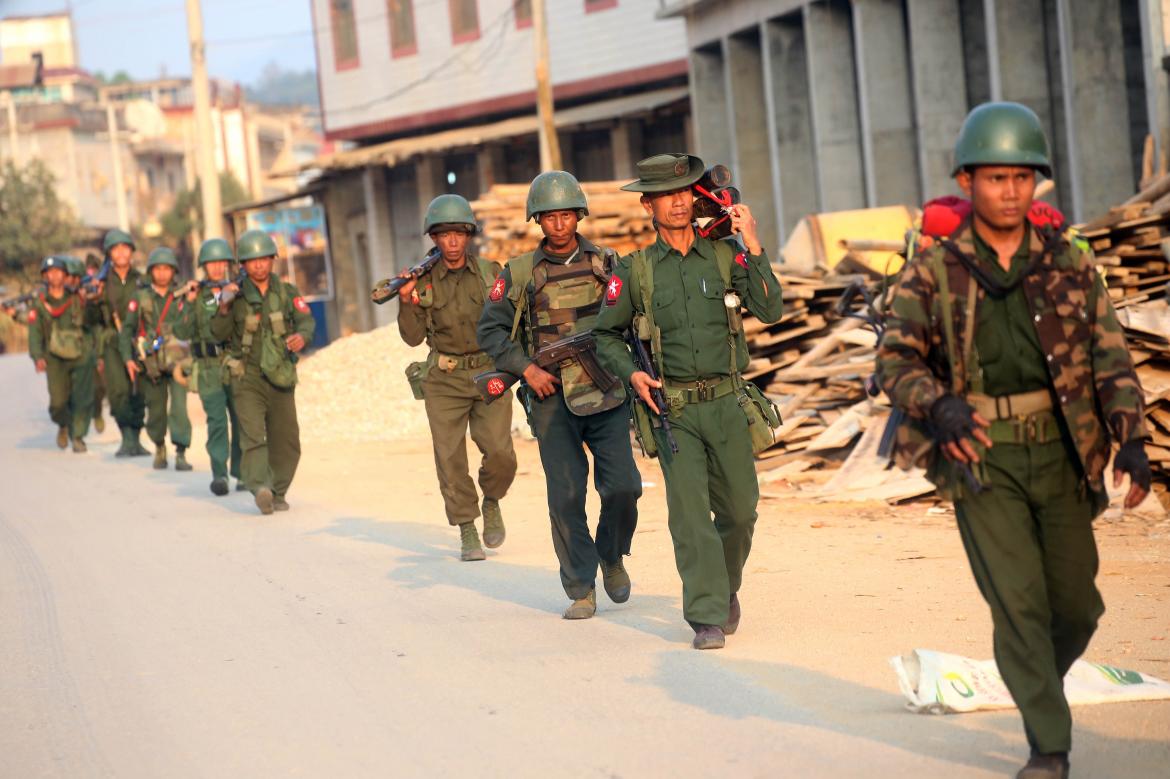After weeks of hard combat with junta troops, a Myanmar rebel alliance group declared late Friday that it had taken control of a crucial region near the country’s northern border with China.
The “Three Brotherhood Alliance,” as the group is known, claimed control of the Kokand Laukkai region after the military’s regional headquarters surrendered.
The fall of Laukkai is the latest win in a widespread onslaught by a coalition of rebel groups that began in October and has been the most significant threat to Myanmar’s military government since it gained power in a 2021 coup.
“The entire Kokang (Laukkai) region has become a land with no Myanmar Military Council anymore,” the message said. A junta spokeswoman did not respond to Reuters’ requests for comment.
The Myanmar National Democratic Alliance Army (MNDAA), the Ta’ang National Liberation Army (TNLA), and the Arakan Army (AA) make up the alliance.
They were accompanied by the loosely organized People’s Defence Force members, supported by Myanmar’s alternative National Unity Government (NUG), indicating that the insurrection is becoming more coordinated and planned.
Since late October, armed fighting between the military and insurgent groups has increased in Myanmar’s north. China has helped foster discussions between the two sides and called for a truce.
Laukkai, the capital of Myanmar’s restive Kokang district, is known as a gambling den and a hotbed for online scam operations. China, a major junta ally with close ties to some ethnic Chinese groups near the border, has grown more upset in recent months by Myanmar’s junta’s failure to close down the fraud centers.
The Three Brotherhood Alliance stated at the commencement of their October onslaught that one of their primary goals would be to clean up the fraud centers. China encouraged its citizens to leave the Laukkai area in late December, citing security concerns. Laukkai was the MNDAA’s old headquarters.
Laukkai’s capitulation “marks the first Regional Operation Command to fall,” political analyst Ye Myo Hein wrote on social networking site X.
Myanmar’s military has over a dozen regional operating commands dispersed nationwide. The recent events in Myanmar have drawn international attention as the country deals with the fallout from a military coup.
Understanding the setting of the coup, its repercussions, and the international response is critical to understanding the situation’s intricacies.
Myanmar’s Road to Democracy Halted
Myanmar, often known as Burma, has had a turbulent political history characterized by military control and periods of democratic advancement. The political landscape of Myanmar changed dramatically in 2015 when Aung San Suu Kyi’s National League for Democracy (NLD) won a resounding win in general elections, ushering in a new era of civilian administration.
Myanmar’s military, the Tatmadaw, seized control of the government on February 1, 2021, detaining key civilian officials, including Aung San Suu Kyi. The military Junta defended its actions by claiming significant electoral fraud in the 2020 elections, which the NLD easily won. The coup essentially stalled the democratic transition and prompted international censure.
The military’s takeover of power caused massive civil unrest and large protests throughout Myanmar. Citizens rushed to the streets, demanding the restoration of civilian authority and the release of jailed leaders.
The military has responded harshly to the protesters, resulting in fatalities and growing tensions.
International Reaction
The world community has sharply condemned the military takeover, calling for the release of political detainees and the restoration of civilian rule.
Sanctions and diplomatic action have been recommended to pressure the military regime to restore democratic principles. However, reaching an agreement on the best course of action remains difficult.
Myanmar’s position remains volatile, with profound political tensions and the possibility of future violence. The path to a peaceful resolution and the restoration of democratic governance is filled with difficulties, but it remains the focus of efforts both domestically and internationally.
Myanmar’s military coup has created a volatile and hazardous situation with serious ramifications for the country’s future and regional stability. Understanding the historical context, present unrest, and global response is critical for navigating the complexity of this growing issue.
By Geoff Thomas






